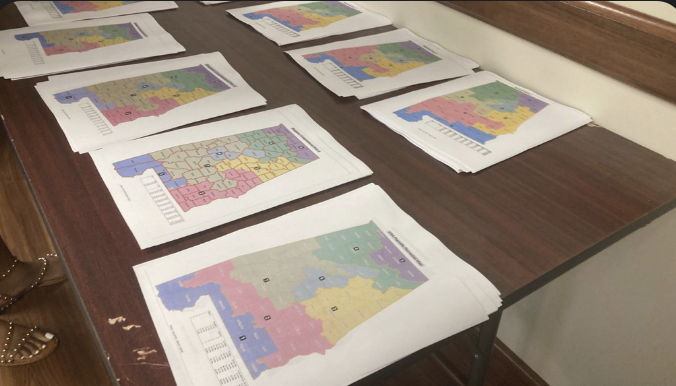By Mike Cason
Black voters who won at the U.S. Supreme Court in their claim that Alabama’s congressional district map violates the Voting Rights Act urged state lawmakers to adopt their proposed new map at a public hearing Tuesday.
Evan Milligan and Letetia Jackson, plaintiffs in the lawsuit, spoke to the Legislature’s reapportionment committee during the 90-minute hearing at the Alabama State House.
The reapportionment committee will review proposed maps in preparation for the special legislative session that starts July 17. A three-judge federal court has given the Legislature until July 21 to approve a new map to be used in the 2024 election.
One of Alabama’s seven congressional districts is majority Black, District 7. The proposed map favored by the plaintiffs would make District 2 a second majority Black district.
“We feel like this is a map that keeps the state of Alabama on the right side of the Voting Rights Act,” Milligan told the committee. “It addresses the issues with our current congressional map that the lower federal panel took issue with and found out of compliance and also that the Supreme Court also recognized was out of compliance with Section 2 of the Voting Rights Act. We strongly urge you to consider our remedial map.”
Jackson read a letter to the committee that said plaintiffs in two lawsuits that were part of the Supreme Court’s ruling, the Milligan case and the Caster case, agreed to support a single map out of the many maps submitted to the committee. The letter reiterated the ruling of the three-judge district court last year, which found that Alabama’s Black population was large enough and geographically compact enough for a second majority Black district. The Supreme Court’s decision upheld the three-judge court.
“Given the extreme degree of racially polarized voting in Alabama, the trial court’s preliminary injunction order, which was upheld by the Supreme Court, emphasized the practical reality that any remedial plan will need to include two districts in which Black voters either comprise a voting-age majority or something quite close to it,” Jackson said, reading from the letter.
Others at the public hearing also spoke in favor of the Milligan/Caster map.
James Blacksher, a longtime redistricting attorney who represents the plaintiffs in a third case challenging the current map, the Singleton case, spoke to the committee about a different map, one that would make District 6 the second district where Black voters would have an opportunity to elect a candidate of their choice. The redrawn District 6 would include all of Jefferson County and a small section of Shelby County. It would have a Black voting age population of 40%, but Blacksher said Jefferson County has enough white voters who lean Democratic to make that an opportunity district for Black voters.
Joe Reed, head of the Alabama Democratic Conference and a longtime participant in redistricting cases, said the ADC would propose a map and present it to the committee before the special session begins. The ADC is the dominant Black political organization in the state Democratic Party. Reed applauded the efforts of the plaintiffs but told the committee he was concerned that the percentages of Black voters in the plaintiffs’ plan were too low.
“We need a clear, safe, two majority Black districts,” Reed told the committee. “Not with one percent here, one percent there, half a percent. I’m taking about something that’s realistic.”
Reed said one of his concerns is that the maps must take into account that portions of the population are in prison and will not be able to vote.
The committee took no action on the proposed maps at today’s meeting. The committee’s next meeting is July 13. The public has until July 7 to submit proposed maps or public comments on the plans. Comments can be emailed to district@alsenate.gov.
The 22-member committee includes 15 Republican lawmakers and seven Democrats. That reflects the Republicans’ strong majority status in the House and Senate. Today, the committee elected two Republicans, Sen. Steve Livingston of Scottsboro and Rep. Chris Pringle of Mobile as the co-chairs.
Sen. Vivian Davis Figures, D-Mobile, urged the committee to pick a Democrat as one of the co-chairs to show a spirit of diversity and bipartisanship. Rep. Laura Hall, D-Huntsville, nominated Sen. Bobby Singleton, D-Greensboro, and Rep. Chris England, D-Tuscaloosa, for co-chairmanships. But the committee elected Livingston and Pringle on 14-7 votes that were split along party lines.
Twelve of the plaintiffs’ proposed maps are posted online by the reapportionment committee. That includes the Milligan/Caster map, listed as the VRA Plaintiffs Remedial Map.











